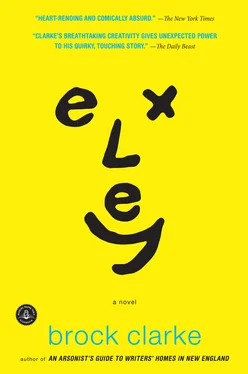Exley looked away from the vacuum cleaner and at me, his watery eyes full of suspicion, if they were full of anything at all. I couldn’t blame him. Who knew how many of his adoring fans came to the New Parrot to get his autograph, to soak up some of his wisdom, to get something from him, some more of what the book had already given them? Who knew how many people had rung that bell, rung it so often that it had begun to go thunk and not ring? Maybe that’s why he didn’t shake my hand. Or maybe he wasn’t strong enough to raise his hand high enough to shake or be shaken. He made a sad, weak noise deep in his throat, staggered a little, then grabbed on to the vacuum cleaner for support. I moved closer to him, and when I did, I started to feel sorry for the vacuum cleaner. He smelled bad, like a baby who’d been left too long in his wet diaper, a baby who’d thrown up and then been covered with that powder that school bus drivers keep handy to cover throw-up, a baby who’d been drinking booze instead of formula. I swore I saw something crawl out of his beard and drop on the floor. I moved back a few steps and toward the door, in the direction of my waiting three-speed.
“Mr. Exley,” I said, “are you OK?”
He shook his head, then kept shaking it, for far longer than was necessary for me to understand that he wasn’t OK, just shaking his head and shaking it like he was rabid. I knew then I had a problem. There was no way I could bring Exley to my father in this condition, which was way too close to my dad’s condition. No, I had to get Exley better before he could do what I needed him to do. And the first thing I needed to do was to get him home, wherever home was.
“Let’s get you home,” I said.
He nodded and made another noise that I understood to mean yes.
“Good,” I said. “Where is it?”
Exley nodded again and opened his mouth to speak, but instead of words, a smell came out. It smelled like something had died in his mouth. The smell did all the talking for him, and what it said was that he wasn’t going to be able to tell me where his home was. But maybe, like a dog in a movie I once saw, he could show me the way home if I just got him out of the New Parrot. I couldn’t expect him to walk while I rode, though, and I couldn’t expect him to ride, either. And I didn’t think I could support both Exley and my bike. So I let him bring his vacuum cleaner. “Let’s go home,” I told him. He nodded and pushed the vacuum cleaner out the front door, out of the parking lot, and left, down the long, long hill into town. It’s working , I thought. I found Exley already and he’s leading me to his house, and as soon as he’s ready, I’ll lead him to my dad. It’s really working! But I should also say that even if it was working, it wasn’t working very fast: plenty of cars had time to pass us, turn around, and pass us again to make sure they’d seen us right the first time. I don’t blame them. We probably made quite a scene, me walking with my three-speed Huffy, Exley walking with his beat-up upright Hoover, making our slow way down Washington Street. If a book is made up of things that are hard to believe, then we were like something out of a book. Maybe, I thought, once I got Exley back into shape, he’d end up writing it.
Doctor’s Notes (Entry 4)
After three unproductive — unproductive and, indeed, counterproductive — meetings with M., I try a new approach and ask the patient if he has ideas as to how I might help him. M. considers this for several moments and then makes an odd request: that I become a different doctor, with a different name, a different manner of speaking and dressing. Even a different hairstyle. Even a beard. M. goes so far as to suggest — suggest and, indeed, encourage —specific things for me to say at certain moments during our meeting: when I first greet the patient, after the patient tells me his most innermost thoughts and fears, when I say good-bye to the patient, etc. Strangely, I agree. Possibly because M. is onto something. Possibly because normal strategies seem not to be working. Possibly because M. is right: possibly a change in doctoring is in order. Possibly Dr. Horatio Pahnee (the name M. has given me) will be able to heal M. whereas I have failed. In any case, I shall think of it as a study — a study and, indeed, a clinical study; if findings are satisfactory, I will present them during my speech at the North Country Mental Health Professionals’ annual meeting later this autumn.
After our meeting, I open the front door to let M. out. I am about to exclaim our newly agreed-upon good-bye when I see the patient’s mother sitting on the porch railing. I have not seen her since our first session, and my arm and arm hair tingle wildly. She and I exchange conventional greetings. She kisses her son on the top of the head and then asks him if he wouldn’t mind waiting in the car, just for a second. M. walks to the car; as he does so, he looks at me over his shoulder. I know how to read his look, and I look back, to tell him I will not betray his confidences. When he is in the car, M.’s mother asks, “How’s it going?”
“Not well,” I answer truthfully. I do not want to tell her the rest of the truth — that we’ve had something of a breakthrough today — because then she will ask for details about the breakthrough and I fear I will tell her.
“Oh,” she says. She looks sadly at the car. Her sadness seems genuine. This is not my area of expertise, exactly, but I believe her to be a good mother. I almost touch her on the arm as she touched me on the arm, to console her. But I fear that my touch won’t tingle her arm as hers tingled mine, and how unbearably sad that would be. She looks back at me. She is still sad about M. Sad, she is still beautiful. “Do you think there’s anything else you could do?” she asks.
“Such as?” I ask. I genuinely want to know. Please help me , I almost say but don’t, as it would be unprofessional in a mental health professional.
“You’ve already read. ” And she names the book with which M.’s father was obsessed, causing, I believe, his son’s obsession, although M. claims not even to have read the book, let alone be obsessed with it. I glanced at the first chapter, and so I know the book is of local origin. Or at least the author is “from around here” (I myself am from Rochester, a veritable metropolis when compared to Watertown). But other than that, I haven’t read the book. I almost tell M.’s mother that and then suggest she read my article in the official proceedings from last year’s North Country Mental Health Professionals’ meeting, which suggests that whereas in the past, people turned to literature to improve their lives, they now turn to their mental health professionals. But clearly she expects me already to have read the book, especially since she gave me a copy of the book after M.’s last session. So I say, “I have read the book.” I try to make my voice as noncommittal as possible, but M.’s mother hears something in it — perhaps what she wants to hear — and says, “I know, it’s awful.” M.’s mother sighs, through her nose, and it sounds light and musical. It is my professional opinion that mental health professionals should never, ever use the word “crazy” to describe their patients, or anyone else for that matter. But it occurs to me that M.’s father must be crazy — crazy and, indeed, insane — to leave someone like M.’s mother. “I worry so much about M.,” she says. “Do you have any other ideas?”
“I have a few ideas,” I say, again noncommittally. M.’s mother waits, I believe for me to list the ideas. When I do not, she says: “Well, do you think you should follow M. or something?”
Читать дальше












